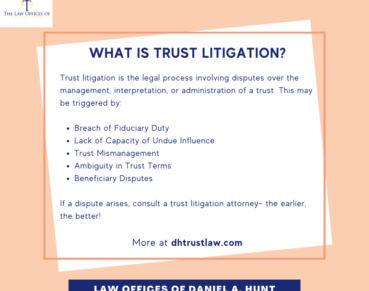How to Win a Trust Contest: A Complete Guide

If you’re considering contesting a trust in California, you’re surely wondering what it takes to win a trust contest. Since trust litigation is expensive and time-consuming, it can be helpful to learn about the elements of a successful lawsuit before you decide to challenge a trust. Here is your complete guide on how to win a trust contest in California.
Only Interested Parties Can Contest a Trust
First, it’s critical to understand that only an interested party to the trust can contest it. An interested party is a person who has a stake in claiming the decedent’s assets. Typically, this includes the current and former trust beneficiaries and the settlor’s heirs.
Most interested parties know who they are because they have received a notice from the trustee regarding the trust administration, as required by the California Probate Code. But there may also be interested parties who would have inherited if the settlor had died intestate (meaning without a will or trust), such as disinherited children.
Finding a Legal Basis
In order to win, the contesting party must have a sufficient legal basis for their position. The person bringing the contest is called the petitioner. The petitioner bears the burden of proof in most cases, meaning they must be able to prove that the document was invalid under California law.
Here are a few examples of potentially successful reasons to contest a trust.
- The settlor lacked the mental capacity when they executed their trust.
If the settlor was radically mentally incompetent at the time they created or updated their trust, you may be able to successfully overturn their trust. Proving this point in court often requires medical doctors to testify that the settlor lacked the most basic level of mental capacity at the time they signed their legal documents, usually due to severe mental illness, dementia, or serious substance abuse. - Undue influence took place.
Was the trust settlor an elderly person who left most or all of their estate to a professional or family caregiver or a new romantic interest? If so, you may be able to contest a trust on the basis of “undue influence” which is “excessive persuasion that causes another person to act or refrain from acting by overcoming that person’s free will and results in inequity.”
To prove this occurred, you would need to prove that someone took advantage of the settlor’s vulnerability by inducing them to change their estate plan to profit themself.
- Forgery occurred.
The signature on the trust document must belong to the settlor. It cannot be signed by a third party on behalf of the settlor. In order to win a forgery accusation, you would need to prove that the signature on the document did not belong to the settlor. This would likely involve handwriting analysis and testimony from a handwriting expert witness. - The trust was not properly executed.
California trusts must meet certain requirements in order to be considered legally executed. If there was something unlawful about the way in which the document was drafted or executed, you may be able to successfully contest it. For example, the trust should be signed and dated by the settlor(s). - Multiple documents exist.
If the settlor created multiple versions of a trust and/or amendments, you may be able to contest an older document if you know a newer document was executed.
Don’t Miss Your Window of Opportunity
Another key element of winning a trust contest involves timing. You should be aware of the relevant timeframes and deadlines involved in contesting a trust.
The California Probate Code requires trustees to send notice of administration to the trust parties within 60 days of the settlor’s death. The notice informs them of their right to a copy of the trust terms. Interested parties have 120 days from the date they received the trustee’s notice to file a trust contest, or 60 days from the date they receive a copy of the trust terms, whichever is later.
If you are contesting the trust on the basis of fraud, then the California general civil statute of limitations applies, giving you three years to pursue fraud.
Hire an Experienced Trust Litigation Attorney
Finally, you will increase your odds of success greatly when you hire an experienced trust litigation attorney. A seasoned trust litigation law firm can help you meet your deadline to file a petition and coach you through each step of your trust contest. Trust and estate litigation is complex and nuanced, and you’ll want to hire a lawyer that specializes in this area.
If you have any questions about how to win a trust contest, feel free to contact the Law Offices of Daniel A. Hunt for a free consultation.
Law Offices of Daniel A. Hunt
The Law Offices of Daniel A. Hunt is a California law firm specializing in Estate Planning; Trust Administration & Litigation; Probate; and Conservatorships. We've helped over 10,000 clients find peace of mind. We serve clients throughout the greater Sacramento region and the state of California.




